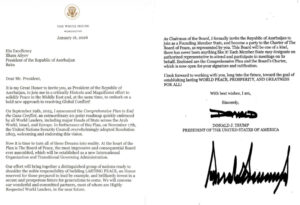Republican US Rep Matt Gaetz moves to oust McCarthy as speaker

Washington, The Gulf Observer: Far-right Republican Representative Matt Gaetz on Monday moved to oust fellow Republican Kevin McCarthy as speaker of the U.S. House of Representatives, injecting an additional element of chaos into an already tumultuous Congress.
Gaetz, who has clashed with McCarthy for months, introduced a “motion to vacate” that would force a vote to remove McCarthy as speaker.
Moments after his much-anticipated move on the House floor, Gaetz held an impromptu press conference in which he acknowledged that his effort might fail – at least on the first try.
“I think that’s the likely outcome,” Gaetz said. But in leaving open the prospect of repeated moves to get McCarthy fired, Gaetz predicted that support could grow and the initial vote on evicting McCarthy would be “the floor and not the ceiling.”
Asked who he would support as a replacement for McCarthy, Gaetz said: “I think very highly of Steve Scalise. I would vote for Steve Scalise” as well as many other Republicans.
Scalise currently serves as House Majority Leader, the No. 2 job in the chamber.
Republicans control the chamber by a narrow 221-212 majority, and it would take as few as five defections to threaten McCarthy’s hold on power, if all Democrats voted against him.
Gaetz and other far-right Republicans are angered that McCarthy relied on Democratic votes to pass a temporary funding extension on Saturday that headed off a partial government shutdown. A faction of about 20 Republicans, Gaetz included, had forced McCarthy’s hand by repeatedly blocking other legislation.
McCarthy has called Gaetz’s leadership challenge disruptive and has said he expects he will survive. “Bring it on,” he wrote on the X platform, formerly Twitter.
Gaetz was one of more than a dozen far-right Republicans who repeatedly voted against McCarthy’s bid for speaker in January. McCarthy ultimately secured the gavel after 15 rounds of voting.
As a condition of winning that January vote, McCarthy agreed to a rules change that allowed any one member to call for a vote to oust the speaker, setting the stage for Gaetz’s move.
No U.S. House speaker has been removed from the position that is second in line in succession for the presidency after the vice president.
It is not clear whether Democrats will vote against McCarthy, as they did in January, or extract concessions to keep him in power.
Several House Democrats late on Monday said they would await direction from party leader Hakeem Jeffries.
Representative Ann Kuster, chair of the moderate New Democrat Coalition, told reporters that supporting McCarthy as speaker “would be a heavy lift,” pointing to the loss of trust after he reneged on a debt limit deal with President Joe Biden and after he launched an impeachment probe against Biden, despite the lack of hard evidence so far of wrongdoing, according to Democrats.
Democrats are also upset that he gave them little time to read the stopgap spending bill before Saturday’s vote, even though he needed their support.
They could demand that McCarthy honor his spending deal with Biden, drop the impeachment inquiry or hold votes on gun and immigration legislation.
Jeffries has not said so far if his caucus would join right-wing Republicans to help topple McCarthy or if Democrats might support him in exchange for political or legislative favors.
The White House has characterized Republicans as unreliable and extreme during the spending fight.
“What we’re seeing with House Republicans is pure chaos,” White House Press Secretary Karine Jean-Pierre said.
The stopgap bill passed on Saturday did not include $6 billion in aid to Ukraine, which is backed by Democrats and many Senate Republicans but opposed by right-wing House Republicans like Gaetz.
It is unclear whether Congress will approve that money.
On the House floor, Gaetz earlier accused McCarthy of having a “secret side deal” with Democrats to approve Ukraine aid.
McCarthy said there was no secret plan and the Biden administration needed to provide more detail on how that money would be spent.
“Our members have a lot of questions, especially on the accountability provisions of what we want to see with the money that gets sent,” he said.
The House and Senate have until Nov. 17 to either pass spending legislation for the current fiscal year or pass another stopgap measure to avoid a shutdown.


